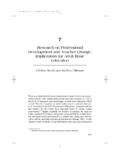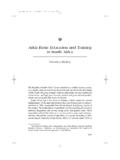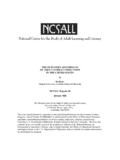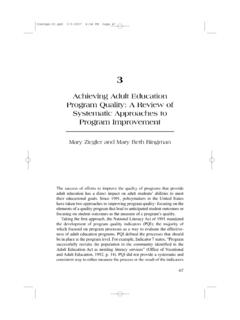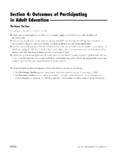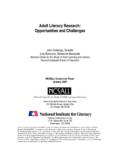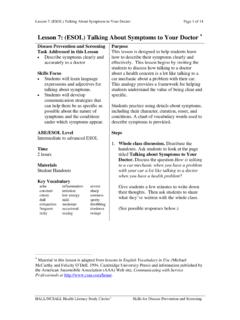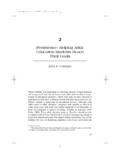Transcription of Handouts and Articles on Classroom Observation, …
1 A D U L T M U L T I P L E I N T E L L I G E N C E S 85 Appendix B To be handed out at Meeting One of the Mentor Teacher Group Handouts and Articles on Classroom observation , Peer Coaching, and Mentoring Handouts (from Peer Coaching, National Staff Development Council) A Comparison of Peer Coaching and Evaluation Principles of Coaching Peer Coaching Cycle Rules for Peer Coaching Pre- observation Questions Post- observation Questions (from observation Guide, NCSALL) Focus Areas and Sample Questions (from NCSALL Mentor Teacher Group on Learner Motivation, Retention, and Persistence, NCSALL) Ways to Gather Information During Class Observations Articles Teachers as Learners, from Rethinking Schools When Good Intentions Go Awry, from Rethinking Schools The Hows and Whys of Peer Mentoring, from Rethinking Schools N C S A L L M E N T O R T E A C H E R G R O U P G U I D E 86 A Comparison of Peer Coaching and Evaluation* PEER COACHING EVALUATION trial and error approach best foot forward give-and-take.
2 Sharing both ways one way learning non-threatening (peers) sometimes threatening (supervisor) forward-looking: improvement-oriented looking backward: what has happened coach is invested in teacher s success administrator may or may not gain if teacher is successful targets specific areas general review, global ongoing often one-shot data: given to teacher data: personnel file teacher being observed does the evaluation administrator evaluates focus is on What I saw. focus often on What I didn t see.
3 FORMATIVE SUMMATIVE * Excerpted from Peer Coaching, National Staff Development Council, December 10, 1991. A D U L T M U L T I P L E I N T E L L I G E N C E S 87 PRINCIPLES OF COACHING Common language Focus Hard Evidence Interaction Predictability/reliability Reciprocity N C S A L L M E N T O R T E A C H E R G R O U P G U I D E 88 PEER COACHING CYCLE A D U L T M U L T I P L E I N T E L L I G E N C E S 89 RULES FOR PEER COACHING THE STANCE 1. We re engaging in exploration, not criticism. We re unraveling a mystery (teaching and learning) together, not monitoring each other.
4 2. An observed lesson is a shared resource; both teacher and coach should take something of value away from any discussion of it. 3. Look for, describe, and assess the practice and its results, not the person s competence. THE TALK 1. Describe first, discuss details later. First describe what happened, using your data. The teacher can take or leave that. Only then discuss what the results were, and only if the teacher initiates the discussion. 2. Talk specifically and concretely. ( You called on Will three times, rather than You tend to call on boys a lot. ) 3. Talk about things which can be changed and which are worth changing. ( , Ignore personal mannerisms, unless they are interfering with student learning.)
5 4. Remember to comment on strengths. Important learning comes from building on our strengths as well as from addressing areas of weakness. 5. Check to insure clear communication. Paraphrase a lot: Are you saying Let me see if I understand 6. Interact. The basic human interaction skills of attending, listening, responding, and acknowledging are important for both the coach and the teacher. N C S A L L M E N T O R T E A C H E R G R O U P G U I D E 90 PRE- observation QUESTIONS 1. How can I be of help to you? 2. What specifically do you wish me to look for? 3. What specifically do you wish me to know? 4. Is there a particular student you would like me to watch?
6 5. What are your objectives and expectations for the lesson? 6. How long would you like me to observe? 7. When can we get together after the lesson? A D U L T M U L T I P L E I N T E L L I G E N C E S 91 POST- observation QUESTIONS 1. How do you think the lesson went? 2. Can you recall what the students were doing that made you feel this way? 3. What do you remember about what you did or the strategies you used? 4. How does this compare with what you expected would happen? 5. What could be some reasons it happened this way? 6. Would you like me to share what I observed? N C S A L L M E N T O R T E A C H E R G R O U P G U I D E 92 Focus Areas and Sample Questions* Page 1 Classroom ARRANGEMENT What is the set-up of the desks and chairs?
7 How far do students sit from each other? From the teacher? Are students clustered in some way? What does the Classroom look like? What things are on the wall? What resources ( , technological, books) are available in the room? Is there a lot of noise in the room? Are there interruptions from outside the Classroom ? Are the chairs comfortable? Is there enough lighting and work space in the Classroom ? Where do people choose to sit? (Does it change over time?) Classroom MANAGEMENT / AUTHORITY What is the Classroom agenda? Who sets it, and how is it? Is the agenda flexible? When a question is asked or a topic raised which diverges from the agenda, what it the response (by teachers, by students)?
8 What is the daily routine ( , signing in, signing out)? What are the Classroom rules? Who decides them? How are they communicated? How do participants call each other (by name, by title)? In what configurations do students work individually, in a large group, or in small groups? What evidence reflects issues of authority in this Classroom ? * Excerpted from observation Guide, National Center for the Study of Adult Learning and Literacy. Revised March 24, 1998. A D U L T M U L T I P L E I N T E L L I G E N C E S 93 Focus Areas and Sample Questions Page 2 Classroom TALK Who talks? To whom, and for how long?
9 What is the interaction pattern one person talking at a time, many people at one time, or a mix? Who regulates this pattern? How is turn-taking managed? How do participants talk to one another (active listening, interrupting, building on what another says)? What do participants talk about (lesson activities, personal experiences, etc.)? How often are there silences and how are they handled? How are multiple perspectives handled? How often are there disagreements? What are they about? How do instructors handle disagreement? TEACHER TALK How does the teacher greet students? What kinds of questions does the teacher ask ( , yes/no questions, questions with one right answer, open-ended probing questions)?
10 To whom does the teacher direct questions? What kind of feedback does the teacher give to questions? How does the teacher show s/he is listening? How does the teacher giver directions? (What kind?) How does the teacher encourage discussion? N C S A L L M E N T O R T E A C H E R G R O U P G U I D E 94 Focus Areas and Sample Questions Page 3 LEARNER TALK What kinds of questions does the student ask? How often? What kinds of answers do the learners give? How long are their responses? How often do learners initiate new topics/offer opinions? What topics/opinions? How do they make connections? Who s talking, and how often?
